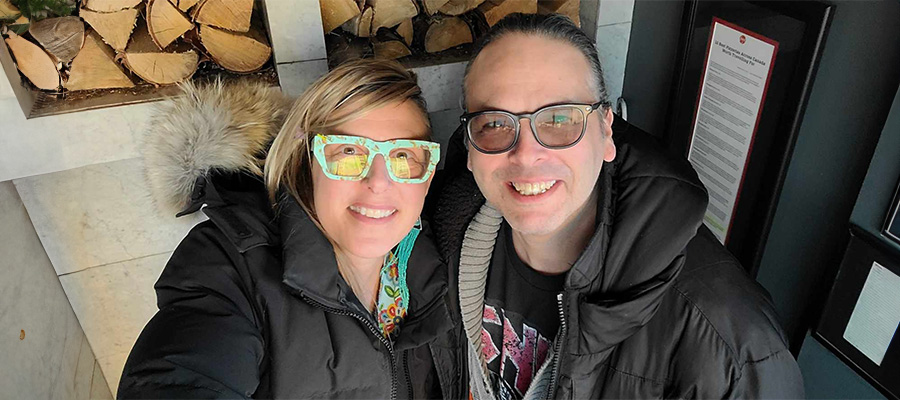

One highlight stands above the rest for Marc Bhalla from the inaugural run of OsgoodePD’s In Search of Reconciliation Through Dispute Resolution, the intensive course he co-founded with fellow Professional LLM in Dispute Resolution grad Andrea Menard.
“I had just discovered this Indigenous group called Snotty Nose Rez Kids and I was able to do some groundwork with their management to get them into the class,” Bhalla explains. “It was wonderful to see how they interacted with the class, demonstrated how much they know and how special they are.”
“Part of the reasons it made me so happy was that I don’t think the average student taking an LLM in Dispute Resolution would ever go to class expecting the guest lecturers to be a couple of rappers,” he adds.
The B.C.-based hip hop duo were among a diverse group of speakers who shared their first-hand experiences with students pursuing a Professional LLM in Dispute Resolution as part of group discussions exploring the past, present and future of reconciliation approaches.
“Indigenous peoples are holistic thinkers, so we don’t judge if a person is a hip hop artist or a justice. Everyone has a gift to bring to the table,” says Menard, the founder of Indigenous Connect Legal Services and a citizen of the Métis Nation of Alberta. “The Snotty Nose Rez Kids talked to us about their lyrics, about the role of tricksters and how we can forgive ourselves for the mistakes we make. We all learned a thing or two.”
But the class wasn’t the first time the two co-instructors had bonded over a shared loved of hip hop music.
Menard traces the origins of her and Bhalla’s enduring academic and personal relationship to 2018, when he dropped the mic after delivering a few of his own rapped verses during a roleplaying session early on in their studies towards their own Professional LLM in Dispute Resolution at Osgoode.
“As soon as he did that, I thought: ‘I really like this guy,’” Menard says.
Despite having almost two decades of experience in the dispute resolution field as both a mediator and arbitrator when he arrived at Osgoode the first time around an LLM student, Bhalla admits he was a little self-conscious about his lack of legal training. But it didn’t take him long to realize that he had little to worry about.
“Our cohort got along really well. One of the advantages of participating in a program like this is that you have people coming from all walks of life,” he says. “Andrea was one of the lawyers in the program who was always very inclusive and friendly.”
Menard says she was drawn to the program as a student because of the resonance between methods of alternative dispute resolution and Indigenous forms of justice.
“In the legal profession, it can be very adversarial and I wanted to bring Indigenous law perspectives into dispute resolution,” she says.
By the time of their 2020 graduation Bhalla and Menard had launched the Authentic Allyship Project, a collaboration aimed at supporting the goal of Indigenous reconciliation.
“I chose Marc to be an ally because he’s creative and you’ve got to be creative on this path. We’re like an Indigenous and non-Indigenous team,” Menard says. “I really feel like non-Indigenous people look to other non-Indigenous people to see what they’re doing to practise accountability. Hopefully we are modelling a good path for those who want to learn how Indigenous people think and how you can collaborate with an Indigenous person going forward.”
The pair’s joint projects include workshops for various law societies and bar associations, as well as Reflections on Allyship, a co-authored book whose sales help fund the Moose Hide Campaign, an Indigenous-led effort to end gender-based violence.
Sensing a gap in the curriculum of Osgoode’s Professional LLM, they also pitched the institution on a course that could go some way to fulfilling some of the Truth and Reconciliation Commission of Canada’s “Calls to Action” dealing with the education of prospective and practising lawyers.
“Thankfully they accepted,” Bhalla says and ALDR 6305: In Search of Reconciliation Through Dispute Resolution was born.
The optional course is currently offered to Dispute Resolution LLM students every two years and ran for the first time in 2022. The timing could not have been better, coinciding as it did with the Pope’s visit to Canada, when he made a landmark apology for the Catholic Church’s role in Canada’s Residential Schools system.
“It was a remarkable experience for the students that had a very big personal impact for many of them,” Bhalla says. “We exposed them to a lot more than they expected, leaping beyond the pages they were reading and having them journey with us to meet Indigenous people from across the country in different walks of life. We had some Indigenous students, but for many of the non-Indigenous students, these were the first encounters they had ever had with Indigenous people in an academic environment.”
“I think the students like the reflection piece. It really gave them a chance know themselves better and to know what it means to be either a settler or an Indigenous person in Canada today doing dispute resolution work,” Menard adds.
Wondering if the Professional LLM is right for you? Get information on course requirements, application dates, tuition and more!

